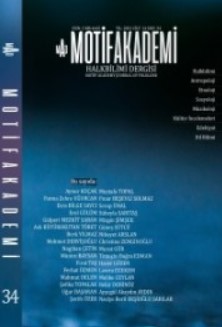YAŞAR KEMAL VE DİDO SOTİRİYU ROMANLARINDA BELLEK UĞRAŞI OLARAK TÜRK- YUNAN NÜFUS MÜBADELESİ
THE TURKISH-GREEK POPULATION EXCHANGE AS A MEMORY STRUGGLE IN THE NOVELS OF YAŞAR KEMAL AND DIDO SOTIRIOU
Author(s): Christina ZENGİNOĞLU, Nihayet ArslanSubject(s): Comparative Study of Literature, Greek Literature, Turkish Literature, Studies in violence and power, Theory of Literature, Politics of History/Memory
Published by: Motif Halk Oyunları Eğitim ve Öğretim Vakfı
Keywords: Turkish-Greek Population Exchange; Yaşar Kemal; Dido Sotiriou; novel; reminding;
Summary/Abstract: The remnants of the war, massacre and exile have tried to testify by various means. Traumatic past and negative memories have inspired artistic and intellectual works. Knowing the pain and losses experienced in different parts of the world required being in the field, keeping records and collecting oral narratives. While the transfer of what happened is possible trough various means from diary to autobiography, the issue of not being forgotten is on the agenda. Testimonies and memories of war victims, fugitives, prisoners and immigrants have been reference sources in the process. In this study, we will argue that novels can serve as reminder tools of a lost period or forgotten events by promoting their social circulation. The fictional intersection and memory transfers of two Anatolian-born writers has allowed us to analyze the reciprocal socio-cultural spasms caused by the Turkish-Greek Population Exchange (1924). The text analyzes the aspects and ways in which population exchange- which is a forced migration and thus stands apart from other types- is brought back in novels as well as its effects on social recall. Besides Yaşar Kemal's quartet titled Bir Ada Hikâyesi and Dido Sotiriyu's İ Nekri Perimenun and Matomena Homata, which are matched with purposeful sampling here, we can study an autobiography that has not been mentioned in any academic media or publications until now. It should be noted that it is complementary. Manolis Aksiotis, who is a real person, and his testimony have allowed us to address many issues from using testimony in fiction to showing witnesses in the novel, allowing us to see that a cognitive record may not distort the original event even when it transforms a fictional record.
Journal: Motif Akademi Halkbilimi Dergisi
- Issue Year: 14/2021
- Issue No: 34
- Page Range: 721-741
- Page Count: 21
- Language: Turkish

